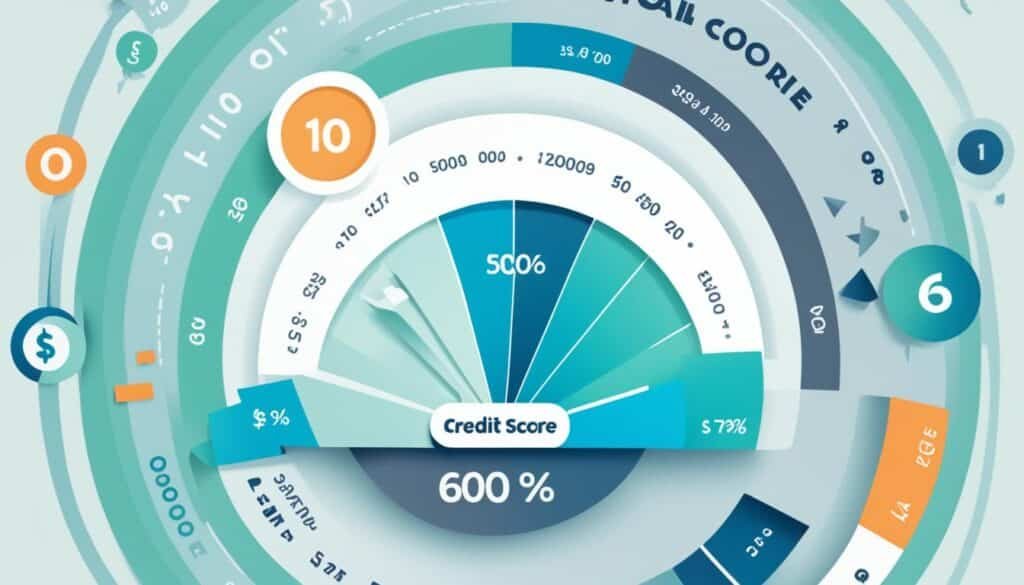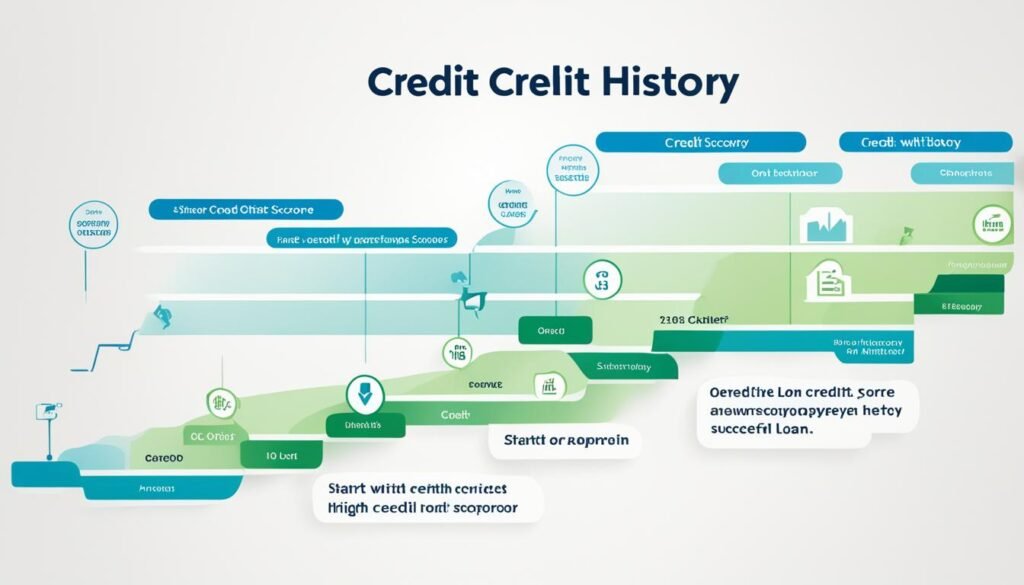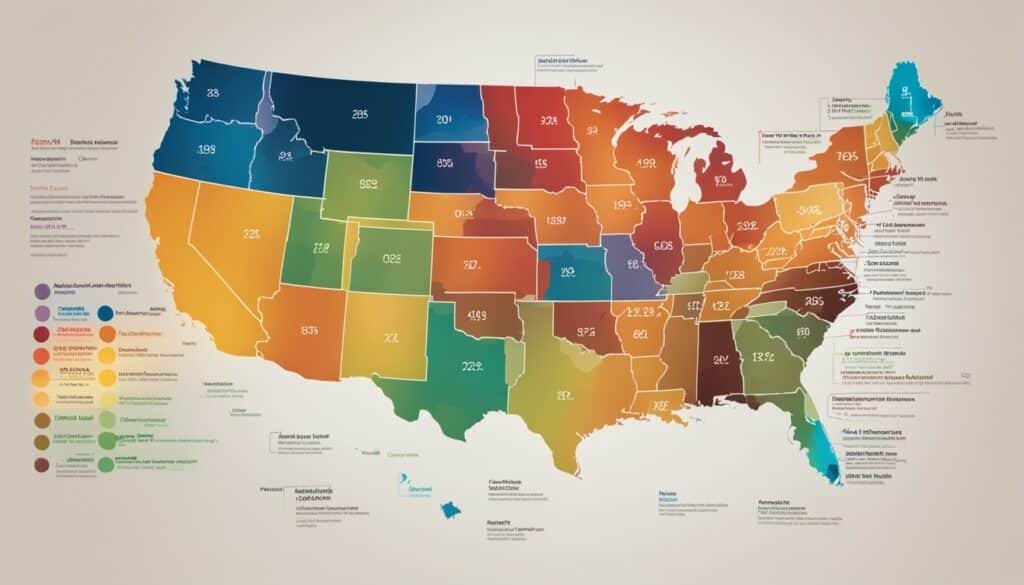How Do I Qualify For And Obtain A Credit-Based Loan?
Credit-based loans are useful for funding your education or achieving personal goals. But it can be tough to find your way in the world of loans and student financing. Let’s look at what lenders consider, how to apply, and the good and bad of these loans.
Getting a private credit-based loan means checking out all your loan options first. For instance, Federal Direct Student Loans help students without any credit check needed. They often have better repayment terms and interest rates than private loans. Then there’s the Federal PLUS Loan, which parents or grad students can use. It’s easier to qualify for than private loans.
Also, some states have their own loan programs. Look into them even if you don’t fit the residency rules for all of them. You might find something that helps.
Key Takeaways
- Federal student loans are available regardless of credit, often with more favorable terms than private loans.
- The Federal PLUS Loan allows parents or graduate students to borrow with less stringent credit criteria than private lenders.
- State-sponsored loan programs may offer additional financing options, but with varying eligibility requirements.
- Thoroughly researching all loan options, including federal, state, and private, is crucial before applying for a credit-based loan.
- Understanding the eligibility factors and application process for credit-based loans can improve your chances of approval and secure the best terms.
Understanding Credit-Based Loans
Credit-based loans help students, graduates, and others pay for school or personal needs. They look at your credit score, history, income, job, and debts to see if you can get the loan.
What is a Credit-Based Loan?
These loans review your credit to decide if you can borrow money. Lenders check your credit to see if they can trust you to pay back the loan. They set the interest and terms based on this info.
Types of Credit-Based Loans
They come in various forms:
- Private student loans: Available from private lenders and require a good credit record.
- Graduate student loans: Made for students pursuing advanced degrees.
- Personal loans: Unsecured, for different needs like education costs.
- Home equity loans: Use your home as collateral, usually with better terms.
Advantages and Disadvantages
These loans have benefits like more money for school or personal use and the use of funds. They may offer lower rates for those with good credit. Yet, they demand a strong credit score and often charge more interest than federal loans. You also need to pass a credit check and application process.
Eligibility Requirements for Credit-Based Loans
To get a credit-based loan, you must meet certain criteria. Lenders check if you are likely to pay back the loan. They look at your credit, how stable your finances are, and if you can handle loan repayments.
Credit Score and Credit History
Your credit score and history matter a lot. You need a good credit score, above the mid-600s. Having a positive debt payment history is vital. Even if your credit is low, having a cosigner with good credit might help.
Income and Employment Status
You also need to show you make enough money and have low debts. This makes it more likely for you to get the loan. Lenders want to make sure you can pay on time. Sometimes, they look at your academic success as well.
Debt-to-Income Ratio
How much you owe compared to how much you earn is important. If this ratio is low, it’s better for your loan application. It shows you can manage another payment.
Applying for a Credit-Based Loan
When seeking a credit-based loan, start by comparing lenders. Look into interest rates, fees, and how you’ll pay back. Also, remember to check how the lenders treat their customers. Doing this helps you get the best loan terms.
Choosing a Lender
Begin by exploring various lenders. Some focus on student loans or credit for education. Others offer different financing choices. Compare what each lender offers. Look at interest rates, fees, and how long you have to pay the loan back. This way, you can find the best deal for your finances and schooling plans.
Required Documentation
Most lenders will need specific documents from you. This might be things like ID or proof of income. You’ll likely need to show that you’re enrolled in school too. And they’ll want to see your credit history. Make sure you have everything they require ready to go. It makes the process smoother.
The Application Process
Applying for a credit-based loan involves a few steps. You may apply online or with a paper form. You’ll need to give them your documents and let them check your credit. For some private education loans, you might need to fill out another form. After reviewing your application, the lender will let you know their decision in a few days.
Factors Affecting Loan Approval

Lenders look at a lot more than your credit score when you apply for a loan. They also check your credit history and other key points. These can sway yes or no on your loan application.
Credit Utilization
One big thing lenders watch is how much of your credit you use. If you keep it under 30%, they see this as good money management. It shows them you don’t need to live on loans, which helps your chances of getting approved for a loan.
Collateral and Assets
If you have something to offer as security, it helps your case with lenders. This could be a car, home, or significant items you own. The value and type of this can impact the risk the lender sees. Having something to put up can get you better loan deals or more cash.
Loan Purpose
What you plan to do with the loan also matters. For example, loans for education are seen as a smart move. They are like an investment in your future earnings. Lenders often like these kinds of loans, so they might be more willing to say yes and offer good deals.
Credit-Based Loan Alternatives

While credit-based loans can help, there are other choices. For example,
Federal Student Loans
these include Direct Subsidized, Unsubsidized, and PLUS Loans. Federal loans don’t need a credit check and have good terms. They’re often better than private loans that check your credit.
Personal Loans
Another choice is a personal loan. They’re not just for school costs. You can use them for many expenses, including college. But, getting a personal loan might be easier because you don’t have as many rules.
Home Equity Loans
allow you to use your house’s value. You can borrow against your home for school costs. But, your home is the security for the loan. This is different from unsecured loans where you don’t risk losing your home.
It’s important to check all options. Look at federal student loans, personal loans, and home equity loans to see what’s best for you. Think about your goals and needs. This way, you can choose the loan that fits your situation best.
Managing Your Credit-Based Loan
Starting your credit-based loan adventure means getting to know what’s out there. Learn about repayment options,interest rates , and any fees. Being informed will help you make smart choices. This is key to handling your loan well as you pay it back.
Repayment Options
With credit-based loans, you can pick from a few ways to pay back what you owe. You might go with standard, graduated, or income-driven plans. Each has its own benefits and effects, so pick carefully. Think about the monthly cost, how long you have to pay, and the interest you’ll end up paying.
Interest Rates and Fees
Interest rates may change with credit-based loans. They depend on your credit and what’s happening in the loan market. Also, check for any origination fees or others that could be charged. Knowing these details will help you plan your finances better.
Refinancing Opportunities
As you repay your loan, things may get better for you financially. Refinancing could then make sense. It might get you a lower rate or better terms, cutting your loan’s cost. Always look into different offers from
Building and Maintaining Good Credit

It’s very important to have a good credit score when you want to borrow money. Your credit score affects the loan terms and interest rates you get. To keep a good credit profile, you need to remember a few things.
Payment History
Your payment history has a big impact on your credit score. Always pay on time for your loans, credit cards, and other debts. Lenders feel more confident giving you loans when they see this record.
Credit Utilization Ratio
Your credit utilization ratio is another key point for lenders. This shows how much of your credit you use. Keeping this ratio low, less than 30%, is good. It suggests you’re not using too much of what’s available. This can help you get better terms on loans.
Credit Mix
The types of credit you have matter too. Lenders like to see that you can handle different credit accounts. Having a mix of student loans, credit cards, and others shows you can manage well. It boosts your chances for good loan terms.
Making payments on time, using credit wisely, and having a varied credit mix are vital. They help you keep a high credit score. This score is crucial when getting loans, for education or other needs. Also, regularly check your credit report. Fix any mistakes to make sure it shows the true you.
Also Read : How Do I Apply For And Obtain A Credit Card?
State-Specific Credit-Based Loan Programs

Many states have their own loan programs for residents, beyond federal and private loans. These state-specific credit-based loan options are great for financing education. They can be used instead of or alongside other loans.
These loan programs have special requirements, interest rates, and payback plans. They match the needs of the people from these places. You might need to live in the state, study a certain field, or show good grades to get one.
If you’re looking into state-specific loan programs, graduate student loans, or education loans for student loans for college, start by talking to your school’s money office. Or contact your state’s education authority. They can give you info on credit-based educational loans, how they decide on rates, when you have to pay back, and who can get these loans.
By finding out about state-specific credit-based loan programs, you might spot a better way to finance your education. This smart approach lets loan providers find the best choices in private student loan or credit-based loan to help pay for school.
Conclusion
Credit-based loans are helpful for students and others needing money for education or other costs. To get the best deal, it’s important to know what lenders look for. Things like your credit score, job, and how much you already owe matter a lot.
Finding other types of loans like federal student loans or personal loans can also be a good idea. It’s smart to know all about the application process and what documents lenders need. This knowledge can really help.
It’s also wise to work on your credit score before applying for a loan. This means paying your bills on time and not using all your available credit. Keeping an eye on local loan programs can also lead to better loan options.
Understanding how credit-based loans work, along with other loan choices, is key. Knowing your options and keeping your credit in good shape can make borrowing money easier and more cost-effective. This helps you reach your financial and personal goals.
FAQs
Q: What is a private student loan?
A: A private student loan is a type of loan provided by a private lender, such as a bank or credit union, to help cover education-related expenses not met by other financial aid options.
Q: How does a credit check impact my ability to qualify for a private loan?
A: Private lenders typically require a credit check to determine your creditworthiness and may use your credit score as a factor in deciding whether to approve your loan application.
Q: What are the loan options for students who do not qualify for federal loans?
A: Students who do not qualify for federal loans may explore alternative loan options, such as private educational loans or loans from private lenders that are based on credit approval.
Q: How can I apply for a private educational loan?
A: You can apply for a private educational loan through a private loan provider, such as a bank or online lender, by completing an application and providing required documentation.
Q: What factors determine the loan rates for private student loans?
A: Loan rates for private student loans are determined by various factors, including the borrower’s credit score, the loan amount, and whether the loan has a fixed or variable interest rate in permanent resident.
Q: What is the difference between a federal loan and a private loan?
A: Federal loans are funded by the government and typically have fixed interest rates and more flexible repayment options, while private loans are provided by private lenders and may have variable interest rates and stricter credit requirements.
Q: How can I qualify for a graduate plus loan?
A: To qualify for a graduate plus loan, you must be a graduate or professional student enrolled at least half-time in an eligible program and meet credit requirements set by the loan provider.
Source Links
- https://www.wellsfargo.com/goals-credit/smarter-credit/credit-101/getting-a-loan/
- https://www.bu.edu/finaid/types-of-aid/loans/credit-based-loans/
- https://www.bankrate.com/loans/student-loans/private-student-loan-requirements/
